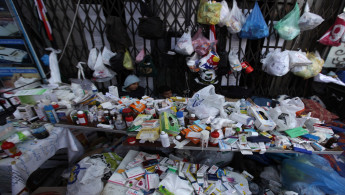Egypt's pharmacies suffering from chronic shortage of medicines
Vital medications necessary to treat life-threatening illnesses are increasingly disappearing off the shelves of Egypt's pharmacies.
Medicines for diabetes, high blood pressure, liver and kidney problems are currently scarce. Other drugs, including certain antibiotics, antidepressants, vitamins and allergy medications have almost completely vanished.
The Egyptian Pharmacy Syndicate has accused drug manufacturers of excessive price rises which means patients can no longer afford to buy supplies.
Drug manufacturers have said that increases in prices are due to rising production expenses and current currency rates that together have made it harder to purchase materials necessary for production.
Pensioners and low-income patients have been hit the hardest.
The crisis has also affected both government and private hospitals.
Families of patients have threatened to encamp on hospital grounds in protest at the high prices.
The shortage in supply of medication has also made the job of pharmacists much harder.
"It is hard to convince a patient to accept drugs other than the ones they are looking for," an Egyptian pharmacist told The New Arab.
"This is a national security problem," he added, speaking on condition of anonymity, "How can a state with a population of over 90 million have some essential medicines completely disappear from pharmacy shelves?"
The lack of medication will lead to increased incidents of infection and the spread of diseases, leading to a higher rate of early deaths, he added.
The problem
Pharmaceutical companies in Egypt are subject by law to a set number of price ceilings that they are forbidden to exceed.
Medicines are grouped according to pricing category, with the lowest starting at $0.64.
At least 75% of all medicines in the market are priced at $2.55.
The rates have been designed to make drugs available especially to those of limited financial means and prices have been mainly stable for the past 25 years.
Pharmaceutical companies complain, however, that as a result they have started to operate at a loss mainly due to rising expenses when importing materials needed to manufacture certain drugs.
Some Egyptian companies have closed down while others have discontinued the production of a number of low-priced pharmaceutical products claiming the rigid pricing constraints.
In 2012, the Egyptian Chamber of Pharmaceutical Industries filed a case against the Egyptian government for a 'balance of rights' between pharmaceutical companies and consumers.
However, the government says it maintains its pricing structure so as to keep medicines affordable to those of limited means.
Meanwhile, a list of urgently required medication has been submitted to the Ministry of Health but has not yet had a response, a source at the Egyptian Pharmaceutical Syndicate has said.
Counterfeit Medicine
The shortage has given rise to a number of illegal operations producing counterfeit drugs unfit for human use.
Shelved on pharmacies across Egypt, especially in Cairo, are boxes of fake medicines bearing the exact names and logos of the originals.
These counterfeit medicines are said are reported to have caused patients increased kidney and liver problems.
"The producers of counterfeit drugs must be charged with premeditated murder," pharmacist Mohammed Saleh tells The New Arab, "These drug mafias have circulated their forged medicines across a number of pharmacies in Egypt."
The participating pharmacies should also face penalties, adds Saleh.
Egyptians start the 'Medicine is a Right' campaign
In protest at the medicine shortage, social media users in Egypt have launched an online campaign entitled 'Medicine is a Right' [el-Dawa Haq] sharing online the names of some medicines in short supply.
If pharmaceutical production in Egypt ceases, at least 30.6 billion USD will be needed to import the required medicine every year.


![Minnesota Tim Walz is working to court Muslim voters. [Getty]](/sites/default/files/styles/image_684x385/public/2169747529.jpeg?h=a5f2f23a&itok=b63Wif2V)






